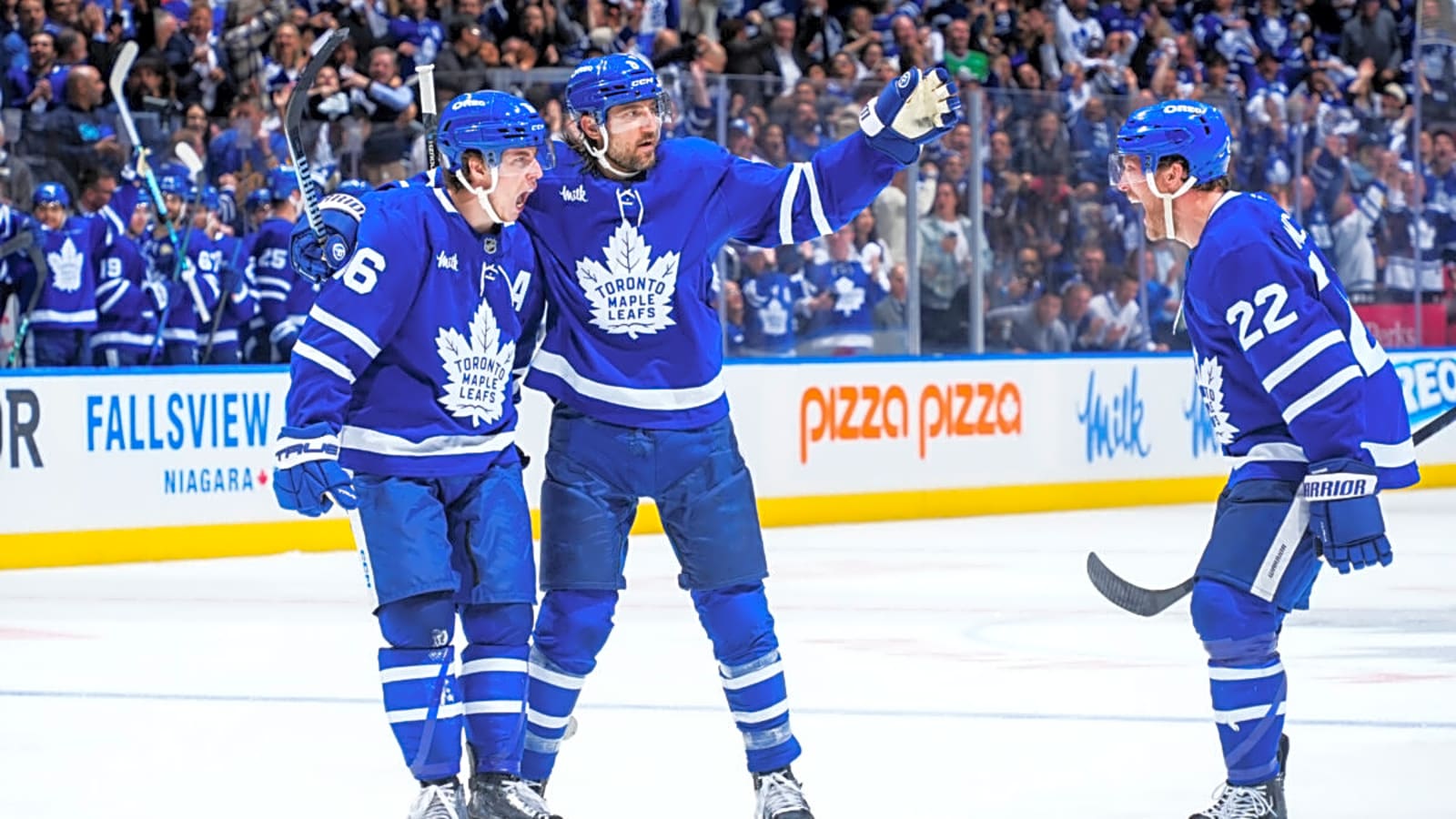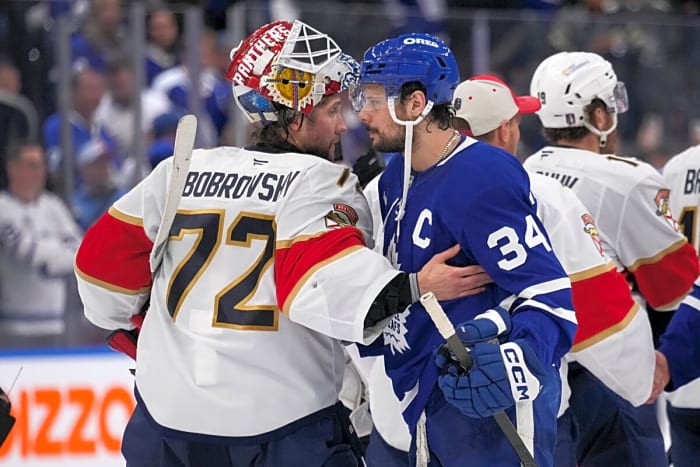
For years, Toronto Maple Leafs fans did what fans do: they trusted. They had no real say in the decisions, but most came to believe in the talent, plan, and promise that progress would eventually lead somewhere better. That’s the natural progress for fans with loyalties tied to an emerging team with a strong talent base.
For almost a decade now, they waited through disappointments, clung to regular-season highs, and (reluctantly) gave the benefit of the doubt. But now, that patience is wearing thin.
Fans can’t make trades or shape culture from the outside, but they’re not naive either. They see the cracks. And they’re watching closely this summer—not with hope, but with expectation. Because if the organization truly believes this team’s identity has to change, this offseason has to be more than noise.
Grit Isn’t Optional Anymore—And It Isn’t Just About Tough Guys
It’s not about fighting. Fans understand that. When they talk about grit, they mean players who go to the hard areas, finish checks, and wear opponents down by being relentless. Guys like Sam Bennett, Brandon Tanev (which is why he’s on many fans’ short list – a sort of comes-with-the-family thing), or even Brad Marchand are the ones who are miserable to play against every shift.
Toronto doesn’t have that. Not really. And while fans might daydream about adding someone like Jack McBain (a 6-foot-4, 219-pound Toronto lad on an expiring contract after scoring 13 goals and adding 14 assists in Utah last season with a hard-as-nails reputation), many know the truth. Grit doesn’t work in isolation. It’s not a trait you plug in; it’s a set tone. And the current leadership group hasn’t built that kind of environment. Bringing in one or two “harder to play against” players won’t change much unless the room itself demands more.
Leadership Isn’t a Buzzword—It’s a Standard
The term fans keep circling back to this summer is compete level. It’s not that Toronto’s core players aren’t talented—they’re among the best in the league. But fans are starting to wonder whether the drive to win is shared with the urgency needed to lead.
Players like Aleksander Barkov and Matthew Tkachuk don’t just produce in Florida. They pull their teammates with them. Their commitment on every shift—blocking shots, taking hits, backchecking—sets a bar. The stats might be similar in Toronto, but the sense of desperation isn’t.
Fans can’t make that change. They can only notice who rises and who disappears when the games start to matter. That noticing becomes even more pronounced when fans reflect on the staggering salaries their heroes command. Mitch Marner, for example, earns $10.9 million per season on his expiring contract. That means someone making $200,000 a year—a salary that places them in roughly the top four percent of Canadian earners—would need to work over 54 years to match just one year of Marner’s income. Meanwhile, earning about $55,000 before taxes, the average Canadian would take nearly 200 years to earn one year of Marner’s salary.
Is it any wonder that fans want their players to seem to care enough to play hard?
The Maple Leafs Depth Problem Is Obvious—So Why Isn’t It Fixed?
No part of the team escaped scrutiny after this season’s exit, but the bottom six forwards were especially glaring. They combined for just two goals in the playoffs—a stat that goes beyond underperformance and points to a deeper structural flaw. Beyond scoring, the group lacked identity, cohesion, and—most critically—impact. The signing of Ryan Reaves felt symbolic of that problem. He could offer neither in a playoff series defined by speed and puck pressure. Fans noticed how redundant he had become. Whether the organization did remains unclear.

Fans don’t expect the bottom six to light up the scoreboard every night. But they expect those players to bring energy and grit, making scoring difficult for opponents, cycling the puck effectively, protecting their own zone, and creating chaos on the ice. It’s less about skill and more about hard work and determination. The bottom six didn’t score, and they didn’t even play with that disruptive physicality that fans expect. That leaves a lot of questions about effort and commitment.
Prospects Like Cowan Offer Hope—If the Maple Leafs Let Them Be Themselves
Easton Cowan gave fans something rare this spring: a glimpse of something new. Not just skill, but energy. Personality. Bite. The kind of player who doesn’t wait to be told how to play—he imposes himself. The makings of a Mini-Me Marchand? (With a nod to the Verne Troyer-played character, of course.)
But fans have seen this before. Players with edge and instinct come in, only to be “smoothed out” by a system that values predictability over passion. Cowan hasn’t played an NHL game yet. Development takes time. Still, there’s a plea underneath the patience: don’t coach the spark out of him. Let players like Cowan shape the culture, not just fit into it.
The Organization Holds the Power—So What Will It Do With It?
Fans don’t set the roster. They don’t control the cap. They don’t get to choose who leads or who stays. But they see the patterns, year after year. They’ve stayed loyal, even as that loyalty has been tested. Now they’re watching—more skeptical than before, more aware of how little say they actually have.

General manager Brad Treliving said the Maple Leafs’ DNA needs to change. That starts with who you bring in and who you believe in. It starts with the kinds of players who lead your team, and the kind of room you build around them. One can hope that, although he showed little in his time thus far with the team, a player like Scott Laughton could become a glue guy who leads by hard work and example.
Can the Maple Leafs Change the Way They Quack?
There’s an old saying: if it looks like a duck, walks like a duck, and quacks like a duck—it’s a duck. So far, the Maple Leafs have been the wrong kind of duck. They win in the regular season, pile up points, and play a skilled, entertaining game. But when the pressure’s on, they vanish. If the Maple Leafs fold in the playoffs, no matter how it looks in October or January, that’s a Maple Leafs team fans have seen too many times.
Fans now want a new kind of duck—a team that wins in the regular season, grinds, fights, shows grit, and brings that same relentless effort into the postseason. They’re not asking for perfection. They’re asking for a new identity that finally redefines what it means to be a Maple Leaf when the postseason comes.
More must-reads:
- Five potentially contentious defenseman negotiations that could spur NHL trades
- Four teams that can challenge Panthers for 2026 Stanley Cup
- The 'Most goals in a Stanley Cup Playoffs' quiz
Breaking News
Trending News
Customize Your Newsletter
 +
+
Get the latest news and rumors, customized to your favorite sports and teams. Emailed daily. Always free!








